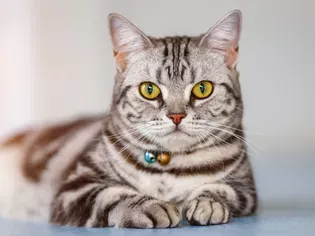Reasons Why a Cat Doesn't Meow
Updated on 04/26/24

Unveiling the Enigmatic Silence of Cats: Delving into the Reasons Why Your Feline Companion May Not Meow
Introduction
The world of cats is a mesmerizing tapestry of vibrant personalities and enigmatic behaviors. Among their most distinctive traits is their distinctive vocalization, the meow. While this charming sound is synonymous with feline communication, there are times when even the most loquacious cats fall silent. This perplexing phenomenon has long intrigued cat owners and feline enthusiasts alike, prompting the question: why do some cats not meow?
In this comprehensive guide, we will delve into the multifaceted reasons behind a cat's lack of meowing. From medical conditions to behavioral quirks, we will explore the underlying causes that may contribute to this curious silence. By gaining a deeper understanding of your cat's unique communication style, you can foster a stronger bond and provide the optimal care for your beloved companion.
Medical Factors Contributing to a Cat's Silence
1. Laryngeal Paralysis: This neurological condition affects the muscles of the larynx, making it difficult for cats to produce sound. Symptoms include a hoarse meow, coughing, and difficulty breathing.
2. Vocal Cord Damage: Trauma, inflammation, or tumors can damage a cat's vocal cords, resulting in a loss of voice.
3. Respiratory Infections: Upper respiratory infections, such as feline herpesvirus or calicivirus, can cause inflammation and swelling in the throat, making meowing painful or impossible.
4. Deafness: Deaf cats may not meow because they cannot hear themselves or other cats vocalizing.
5. Pain or Discomfort: Severe pain or discomfort, such as dental disease or arthritis, can make meowing uncomfortable or even painful, leading to silence.
Behavioral Reasons for a Cat's Lack of Meowing
1. Individual Personality: Cats, like humans, have unique personalities. Some cats are naturally more vocal than others, while others prefer to communicate through body language or subtle vocalizations.
2. Environmental Factors: The environment can influence a cat's vocal behavior. Cats living in noisy or chaotic environments may meow less to avoid adding to the noise.
3. Socialization: Kittens who are not adequately socialized with humans may not learn to meow as a way to communicate.
4. Breed Differences: Certain cat breeds, such as the Siberian and Ragdoll, are known for being less vocal than others.
5. Age: As cats age, they may become less vocal due to physical changes or a decrease in activity levels.
Assessing Your Cat's Silence
Identifying the reason behind your cat's silence is crucial for ensuring their well-being. If your cat has suddenly stopped meowing, it is recommended to schedule a veterinary examination to rule out any underlying medical conditions.
Encouraging Your Cat to Meow
While some cats may never meow excessively, there are ways to encourage them to vocalize more:
1. Talk to Your Cat: Engage in frequent conversations with your cat, using a gentle and soothing tone.
2. Play with Toys: Interactive toys that stimulate your cat's hunting instincts can trigger meowing.
3. Provide Scratching Posts: Scratching is a natural behavior that can stimulate meowing.
4. Create a Calm Environment: Cats may be less vocal in stressful environments. Providing a safe and comfortable space can encourage meowing.
Conclusion
Understanding the reasons why a cat doesn't meow is essential for fostering a harmonious and fulfilling relationship with your feline companion. By considering the various medical and behavioral factors that may contribute to silence, you can provide appropriate care and support for your beloved pet. Remember, each cat is unique, and their communication style is a reflection of their individual personality and experiences. By embracing the enigmatic silence of your furry friend, you will deepen your bond and appreciate the subtle nuances that make your cat so special.
Explore More Pets

Cat Behavior Problems
How to Stop Aggression in Kittens

Long-Haired Cat Breeds
Siberian Cat: Breed Profile, Characteristics, & Care

Cat Behavior Problems
How to Stop Kittens From Scratching and Biting

Long-Haired Cat Breeds
Turkish Angora: Cat Breed Profile, Characteristics & Care

Basic Training
How to Socialize Your Kitten

Short-Haired Cat Breeds
Cute Pictures & Facts About Calico Cats & Kittens

Litter Box Training
Training Your Kitten to Use the Litter Box

Long-Haired Cat Breeds
10 Fun Facts About White Cats